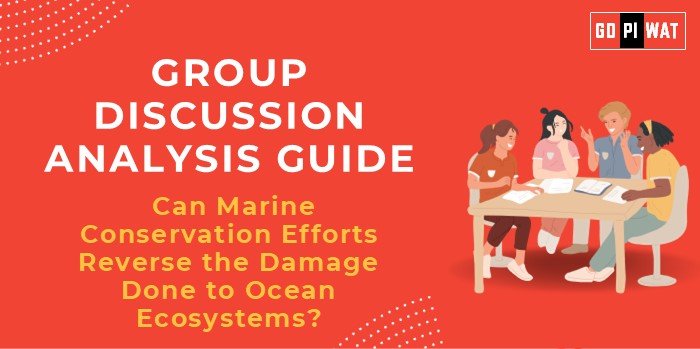🌊 Group Discussion (GD) Analysis Guide
Can Marine Conservation Efforts Reverse the Damage Done to Ocean Ecosystems?
📚 Introduction to the Topic
Opening Context: Oceans cover over 70% of the Earth’s surface and play a vital role in regulating climate, providing food, and supporting biodiversity. However, years of overfishing, pollution, and climate change have severely damaged marine ecosystems.
Topic Background: The United Nations has declared the 2021-2030 period as the Decade of Ocean Science for Sustainable Development, underlining global efforts to restore marine health. Recent successes in coral reef restoration and marine protected areas (MPAs) suggest that recovery is possible, but challenges remain.
📊 Quick Facts and Key Statistics
- Global Fish Stock Depletion: 34% of global fish stocks are overexploited (FAO, 2022).
- Plastic Pollution: Over 11 million metric tons of plastic enter oceans annually (UNEP, 2021).
- Marine Protected Areas (MPAs): Currently cover 7.7% of the ocean surface, with a target of 30% by 2030 (IUCN, 2023).
- Economic Loss: Ocean degradation costs the global economy an estimated $83 billion annually (World Bank, 2023).
🤝 Stakeholders and Their Roles
- Governments: Enforce fishing regulations and expand MPAs.
- NGOs and Environmental Groups: Advocate for policy changes and conduct conservation projects.
- Private Sector: Develop sustainable seafood markets and innovate in waste management.
- International Organizations: Provide funding and set conservation targets (e.g., UN, WWF).
- Local Communities: Contribute to monitoring and sustainable resource use.
🌟 Achievements and Challenges
Achievements
- Coral Restoration: Initiatives like the Coral Triangle Project have shown significant success in biodiversity recovery.
- Marine Protected Areas: Palau’s National Marine Sanctuary protects 80% of its waters, aiding biodiversity.
- Global Awareness: Campaigns like BeatPlasticPollution have mobilized millions worldwide.
Challenges
- Plastic Pollution: Increasing microplastic contamination threatens marine and human health.
- Climate Change: Warming oceans and acidification disrupt ecosystems.
- Enforcement Gaps: Illegal, unreported, and unregulated (IUU) fishing persists globally.
🌍 Global Comparisons
- Success: Australia’s Great Barrier Reef management integrates science and policy.
- Challenge: In West Africa, IUU fishing undermines local livelihoods.
Case Studies
Sundarbans, India: Mangrove ecosystem restoration has protected biodiversity while safeguarding communities from cyclones.
💡 Structured Arguments for Discussion
- Supporting Stance: “Marine conservation efforts like MPAs have proven to increase biodiversity and replenish fish stocks.”
- Opposing Stance: “Conservation alone cannot combat the scale of climate change impacts and pollution.”
- Balanced Perspective: “While marine conservation shows promise, a holistic approach involving global cooperation is essential.”
🔗 Effective Discussion Approaches
- Opening Approaches:
- “With only 7.7% of the oceans protected, how can we achieve the 30% target by 2030?”
- “The Great Barrier Reef’s restoration success offers a blueprint for marine conservation globally.”
- Counter-Argument Handling:
- “Although funding remains a challenge, public-private partnerships have shown significant promise in coral restoration.”
- “While climate change is a critical factor, MPAs mitigate immediate threats, offering resilience.”
📈 Strategic Analysis of Strengths and Weaknesses
- Strengths: Global awareness, innovative restoration techniques, increasing funding.
- Weaknesses: Insufficient enforcement, high restoration costs, climate unpredictability.
- Opportunities: Eco-tourism, technological innovations, global partnerships.
- Threats: Rising sea temperatures, political resistance, over-dependence on single solutions.
📌 Connecting with B-School Applications
- Real-World Applications: Analyze eco-tourism’s financial sustainability, explore supply chain impacts of sustainable fishing.
- Sample Interview Questions:
- “What lessons can business leaders learn from marine conservation success stories?”
- “How can sustainability principles from marine ecosystems apply to corporate strategy?”
- Insights for B-School Students:
- Marine conservation teaches resource optimization, long-term planning, and stakeholder management.


